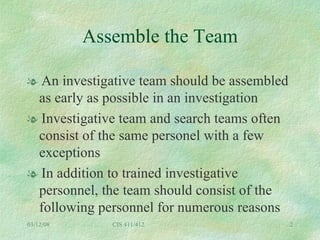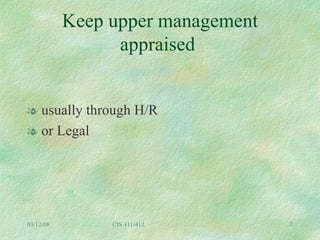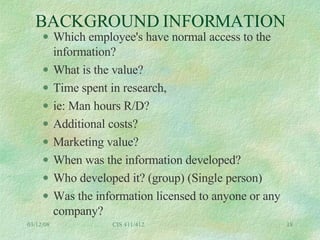Investigative Team
- 1. Investigative Team In Private Enterprise Differs from Criminal Investigation 4th amendment does not apply No arrest is imminent Many internal considerations involved Ultimate goal may differ Mitigate losses Employee termination Protect company assets
- 2. Assemble the Team An investigative team should be assembled as early as possible in an investigation Investigative team and search teams often consist of the same personel with a few exceptions In addition to trained investigative personnel, the team should consist of the following personnel for numerous reasons
- 3. Security: (at the company) "For obvious reasons” Potential litigation Potential losses Unwanted Publicity Moral Hamper the Investigation ?
- 4. Human Resources: Employee issues may arise out of your investigation .
- 5. H&R Considerations Some companies require their H/R personnel to be involved in internal investigations of their employees. In most cases H/R is required to protect or look out for the employee interest. If the employee is going to be suspended/ terminated it will usually involve H/R.
- 6. Legal department: Legal issues dealing with employee rights Protecting the civil interests of the company Avoiding (minimizing) potential lawsuits Coordination of press releases or related issues
- 7. Keep upper management appraised usually through H/R or Legal
- 8. Company liability issues Upper or Senior Management: Money issues may arise during investigation. Without them on your side you may not have a case. Investigative cost reimbursement? Upper management decides to report or not to report the crime. Be proactive
- 9. Identify company policy issue's Remember that upper management can help your case tremendously if they are on your side. Communication is the key to this relationship.
- 10. Example of Investigation Involving Significant Policy Issues theft of Proprietary Information Are documents containing the information marked "proprietary or confidential ?" Is there a method that the company uses to color code or identify it's proprietary information? Are these documents marked on every page?
- 11. Theft of Proprietary Information Does the company have a policy in place as to who receives or should have such documents in their possession. "Proprietary information" Non disclosure forms signed by employees ? What are the company's procedures of disclosure ?
- 12. Theft of Proprietary Information Is there someone responsible for reviewing releases of information to the public? Reviewing the information to insure it's not trade secrets. Are employee's allowed to take proprietary information home?
- 13. Theft of Proprietary Information Has the employee been told that they cannot disclose company information to competitors or to the public? (by whom) What is this information worth?
- 14. Theft of Proprietary Information What is discussed when an employee leaves the company regarding Proprietary information? Does the exit interview cover proprietary information? Are the employees reminded or given memos or updates regarding security or release of information. Are signs posted in the company regarding security or protection of proprietary information.
- 15. BACKGROUND INFORMATION What is the type of proprietary information? How is it used? What tangible items contain the information? (different types of storage info) Could a competitor improve their product with this information?
- 16. BACKGROUND INFORMATION How was it stolen or accessed? Via telephone lines i.e.: internet or other computer software? From another computer inside of company? Log on Log off information (passwords) ? Most companies keep log on logs . Times and dates are important.
- 17. BACKGROUND INFORMATION Is there a systems person that can explain in plain english how this crime happened? Is the information protected from the outside? (fire wall) How often are the access passwords changed? Is there a policy in place about sharing or exchanging passwords?
- 18. BACKGROUND INFORMATION Which employee's have normal access to the information? What is the value? Time spent in research, ie: Man hours R/D? Additional costs? Marketing value? When was the information developed? Who developed it? (group) (Single person) Was the information licensed to anyone or any company?
- 19. The End



















